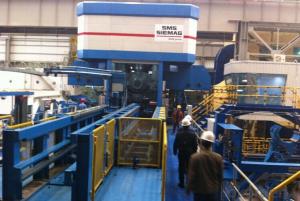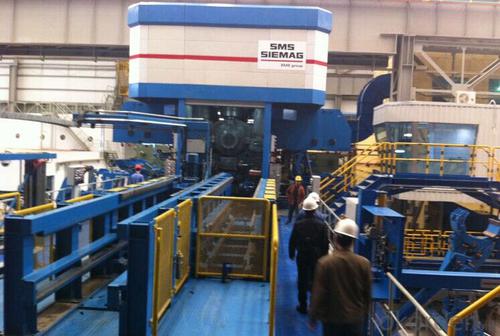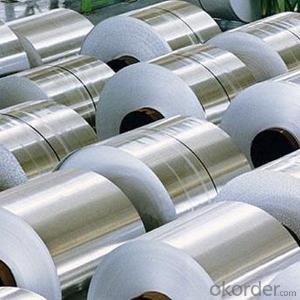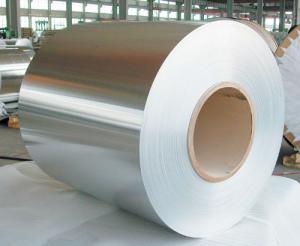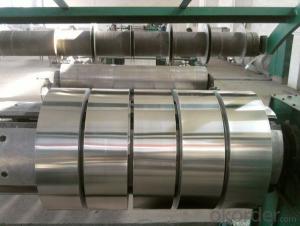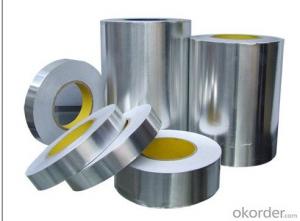Aluminum Coil Rolls - Aluminium Foil Stock
- Loading Port:
- China Main Port
- Payment Terms:
- TT OR LC
- Min Order Qty:
- -
- Supply Capability:
- -
OKorder Service Pledge
Quality Product, Order Online Tracking, Timely Delivery
OKorder Financial Service
Credit Rating, Credit Services, Credit Purchasing
You Might Also Like
We produce prepainted aluminum coil and strip for aluminum twist off and crown caps production professionally.
The detail information as following:
Thickness :0.10mm-0.30mm
Prepainted: PE, PVDF and others
Width :20-1500mm
Alloy : 8011 mainly
Temper : H16
Usege: Twist off and caps
Pack details:pack in rolls with plastic film by wooden box.
Container loading: 1x20ft container can load about 18 tons.
- Q: What is the mass of 3.45 moles of Aluminum sulfate?Can u explain how?
- Aluminum sulfate is Al2S3, so you got two atoms of aluminum and three of oxygen. Hence the molar mass of aluminum sulfate is: 2X16 (two times molar mass of oxygen) + 3X32 (three times molar mass of sulfur). Keep in mind that the molar mass of an elements equals its mass number. We have 128 grams per mole or 128 pounds per lb-mol. Since you have 3.45 moles of Al2S3 you just have to do 3.45 times 128 = 441.6 grams
- Q: What are the typical applications of aluminum coils in the automotive industry?
- Aluminum coils are widely used in the automotive industry for various applications due to their advantageous properties. One typical application is in the manufacturing of automotive heat exchangers, such as radiators and condensers. The high thermal conductivity of aluminum allows for efficient heat transfer, enhancing the cooling efficiency of the vehicle's engine and air conditioning system. Another common use of aluminum coils in the automotive industry is for making lightweight body panels and structural components. Aluminum is known for its low density, which helps reduce the overall weight of the vehicle. This, in turn, improves fuel efficiency and reduces emissions. Additionally, aluminum's high strength-to-weight ratio makes it ideal for impact-absorbing structures, enhancing the safety of the vehicle. Aluminum coils are also utilized in the production of electrical wiring systems and connectors in automobiles. Aluminum's excellent electrical conductivity enables the efficient transmission of electrical signals throughout the vehicle. Furthermore, its corrosion resistance properties make it suitable for use in various weather conditions. Moreover, aluminum coils find application in the production of suspension systems, such as control arms and knuckles. The stiffness and durability of aluminum help enhance the vehicle's handling and responsiveness, resulting in improved driving dynamics. In summary, the typical applications of aluminum coils in the automotive industry include heat exchangers, lightweight body panels, electrical wiring systems, and suspension components. These applications capitalize on aluminum's advantageous properties, such as high thermal conductivity, low density, excellent electrical conductivity, and corrosion resistance.
- Q: Can aluminum coils be used in the production of aluminum composite ceilings?
- Yes, aluminum coils can be used in the production of aluminum composite ceilings. Aluminum coils are commonly used as the base material for manufacturing aluminum composite panels, which are then used in various applications including ceilings. The coils are processed and coated to meet the desired specifications and aesthetics of the composite ceiling panels.
- Q: What influence do aluminum coils have on the welding process?
- <p>Aluminum coils can significantly affect welding work due to their unique properties. Aluminum has a high thermal conductivity, which requires more heat input to achieve the necessary temperature for welding. It also has a high oxide layer that can interfere with the welding process, leading to porosity and poor joint strength if not properly managed. Additionally, aluminum's low melting point can cause challenges in maintaining the correct temperature during welding. Specialized techniques, such as TIG (Tungsten Inert Gas) welding, and the use of appropriate filler materials are often necessary to ensure a successful weld. Proper cleaning and preparation of the aluminum surface are also crucial to prevent contamination and ensure a strong, defect-free weld.</p>
- Q: You guys may be thinking, why the hell i posted this in the computer section. Well, I'm opening my computer, and I hate the anti-static wristbands. I know that by touching metal, you can get rid of all static electricity in your hands. Can you do this by touching aluminum foil? Since it's something everyone should have in their house.. Can it work like this?
- No, okorder /
- Q: Are aluminum coils suitable for electrical insulation applications?
- No, aluminum coils are not suitable for electrical insulation applications. Aluminum is a highly conductive material, meaning it allows the flow of electricity. In electrical applications, insulation is required to prevent the flow of electricity and protect against short circuits or electrical shocks. Therefore, materials with low electrical conductivity, such as plastics, rubber, or fiberglass, are commonly used for electrical insulation purposes.
- Q: Can aluminum coils be used in extreme weather conditions?
- Aluminum coils are capable of being utilized in the harshest weather conditions. With its exceptional durability and resistance to corrosion, aluminum proves to be a formidable material that can endure extreme heat, cold, humidity, as well as heavy rain or snow. Notably, it finds extensive employment in essential areas where weather resistance holds paramount importance, including air conditioning systems, refrigeration units, and outdoor equipment. These coils are expressly engineered to possess remarkable strength and dependability, ensuring their suitability for deployment in severe weather conditions, all the while maintaining optimal performance and lasting durability.
- Q: Can aluminum coils be anodized in different colors?
- Yes, aluminum coils can be anodized in different colors. Anodizing is an electrochemical process that creates a protective oxide layer on the surface of aluminum, which can also be used to impart different colors to the metal. By controlling the process parameters such as the type and concentration of electrolyte, voltage, and duration of anodizing, different colors can be achieved. The color variation is primarily due to the interference and reflection of light caused by the porous oxide layer formed during anodizing. This means that aluminum coils can be anodized in a wide range of colors, including but not limited to black, bronze, gold, blue, red, and green. The ability to anodize aluminum in different colors makes it a versatile material for various applications, such as architectural, automotive, and decorative purposes.
- Q: i have a project that requires me to know how safeway aluminum foil is made. i researched it on the internet, and also called safeway for it. they never gave me an answer. same for the diamond aluminum foil.please help!!!!i just need to know where they make it, how thick it is, and/or information about the ingots (such as size)and also temp. of heating room
- I'd okorder /... and they have some things on sheet as well. Something that neither covers is the lamination process, wherein the aluminum foil is coated with an organic layer (a really thin layer of plastic) to keep the metallic taste out of the food that it contacts. I believe that different companies have different ways of applying the coatings, but I'd bet they're all some variant of dip, brush, or spray followed by a heat cure. Good luck on your project!
- Q: Are there any restrictions on the export or import of aluminum coils?
- Yes, there are restrictions on the export or import of aluminum coils. These restrictions can vary depending on the country and the specific regulations in place. Some common restrictions include export licenses, quotas, and tariffs. Export licenses may be required to ensure compliance with export control regulations, especially for sensitive industries or countries. Quotas may limit the quantity of aluminum coils that can be exported or imported within a specific time frame. Tariffs are taxes imposed on imported goods, which can affect the cost and competitiveness of aluminum coils in the market. Additionally, there may be restrictions related to quality standards, environmental regulations, or trade agreements between countries. It is important for individuals or businesses involved in the export or import of aluminum coils to thoroughly research and understand the specific restrictions in their respective jurisdictions. Consulting with legal or trade experts can be helpful in navigating these restrictions and ensuring compliance with applicable laws.
Send your message to us
Aluminum Coil Rolls - Aluminium Foil Stock
- Loading Port:
- China Main Port
- Payment Terms:
- TT OR LC
- Min Order Qty:
- -
- Supply Capability:
- -
OKorder Service Pledge
Quality Product, Order Online Tracking, Timely Delivery
OKorder Financial Service
Credit Rating, Credit Services, Credit Purchasing
Similar products
Hot products
Hot Searches
Related keywords
